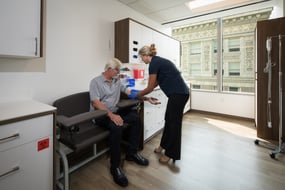Antibiotics are one of the most powerful medical tools in a provider’s arsenal. That power comes with a great deal of responsibility. Overuse of antibiotics can actually lead to decreased effectiveness as bacteria build up an immunity to each new version of an antibiotic. To find out more about this medical arms race, we chatted with Vera provider, Dr. Emily Dy, about the issue . Here’s what she had to say.
Why is overuse of antibiotics a big issue?
People are improperly getting antibiotics because of demand or lack of knowledge. According to the CDC, about 30-50% of antibiotics are prescribed unnecessarily.
There’s specific education that should be a part of the process. One of the other reasons why we should be careful in choosing when to use antibiotics is that there are side effects, which can be anything from diarrhea or a yeast infection to even rare cardiac side effects. There are also cons because of increasing antibiotic resistance.
Providers should be looking at the severity of a patient’s symptoms, and cause and type of infection, to determine whether antibiotics are necessary and, if so, what type and what duration are suitable. The answer should be based on established guidelines.
Why are people pushing to get antibiotics?
The world of technology makes it easier for people to do their own research. Many patients come in having done internet research so they already have set expectations, such as expecting to receive antibiotics.
Experience and asking more delving questions can be helpful to understand the full picture for an effective management plan. Many times, a follow-up appointment, instead of antibiotics, is the best course of action to see if their management needs adjustment. Some people need to be on antibiotics while others may need a follow-up.
What are some common misconceptions around antibiotics?
There are misconceptions that antibiotics will take care of their illness immediately, which may or may not be the case. It’s important to understand that antibiotics are used to treat bacterial infections, not viral infections, which are more common (like colds and flus). Most viral infections go away in a week or two. To know for sure if you need an antibiotic, make an appointment with your Vera provider, especially if your symptoms don’t improve.
Another misconception is that people think they won’t have any symptoms after taking antibiotics. That’s not necessarily true. They may still have post-nasal drip or a little bit of a sore throat afterwards. If patients aren’t feeling better after taking the antibiotics, or if they’re not better after they’ve been given a management plan, they should always follow up.
How does overuse of antibiotics lead to drug resistance?
If people go to the "biggest guns," and if they’re overused, they no longer have the ability to be able to use some of our stronger medications. If we’re constantly handing them out, we could be inadvertently contributing to the creation of medication tolerant bacteria.
From a community level, we need to do our part to make sure we’re using antibiotics for the right purpose. That way, we’ll decrease the amount of resistance that is developing.
What can patients do to stay healthy so this isn't an issue?
If you’re sick, help prevent the spread of your illness with good preventative practices. Wash your hands, wear a face mask, cough into your elbow, and stay home when you’re sick.
Make sure your daily lifestyle includes low stress, plenty of water, a healthy diet, regular exercise, and seven to eight hours of sleep each night. Even if you’re getting six hours of sleep, you’re potentially giving yourself an opportunity to decrease immunity, and increasing stress. As always, get your recommended vaccines for the flu as fall approaches.
Sign up
Join our email list to receive the latest open positions, Vera Careers news, and more.





